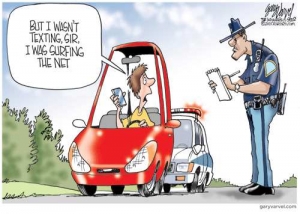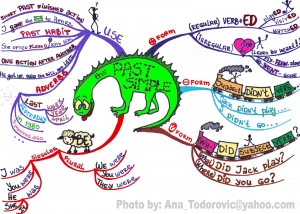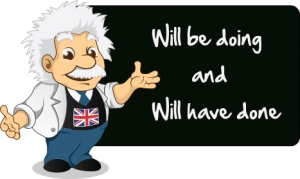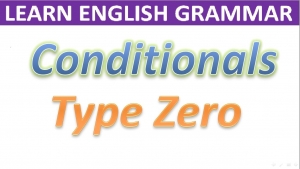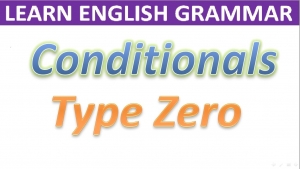Майя
Маткевич
Учитель английского языкаPresent Perfect
Unit 13 - Present Perfect (I have done) (1)
Unit 13
Present Perfect (I have done) (1)
(a) Present Perfect относится к настоящему времени и не употребляется в повествовании, где описываются действия в прошлом!
Present Perfect употребляется для выражения законченного действия, но результат этого действия непосредственно связан с настоящим, причём в этом случае для нас важно совершение этого действия.
|
- I have broken my pencil! - I can not write the dictation. Не так важно когда, главное, что:I have got no pencil now. и результат:I have no pencil to write with. |
|
Спряжение глаголов в Present Perfect (Simple) |
|
I/we/they/you have(= I've etc.)
he/she has (= he's etc.) |
broken
|
|
I (etc.) haven't
he/she hasn't |
broken |
have you(etc.)
has he/she |
broken? |
- She has gone off to the woods. (= She is in the woods now.)
- Have you washed your hands? (= Are they clean now?)
Present Perfect образуется при помощи
have/has + the past participle.
Past Participle обычно имеет окончание -ed
(opened, decided), но много и неправильных глаголов (broken,lost, written, done и т.д. см.Appendix 2).
(b) C этим временем могут употребляться слова just
(небольшой отрезок времени тому назад) и
already(действие случилось быстрее,чем ожидалось):
- What’s the matter? Why are you so sad?
- I have just received a letter from my friend. She is ill.
- Do you know that Tom...?
- We have already heard about that!
- May I go for a walk?
- You must do your homework.
- I have already done it.
- Let’s water the plants! - I have just done it.
(c) Помните разницу между gone to и been to.
См. также Unit 119.
- Pussy Cat, Pussy Cat,
Where have you been?
- I have been to London
To look at the Queen.
Это означает, что кошка была в Лондоне, но уже вернулась назад.
- Don’t look for the cat. It has gone to the garden. (= The cat is not
here, it is either in the garden или on its way
to the garden.)
Unit 14 - Present Perfect (I have done) (2)
Unit 14
Present Perfect (I have done) (2)
(a) Рассмотрим пример:
Jane: Have you read any books by Dostoyevsky?
Mary: Yes, I have read some.
Jane: And have you read any books by Chekhov?
Mary: Of course, I have read his plays and short stories.
He is my favorite Russian writer.
Jane: And what about Bel’yaev?
Mary: I have never heard of this writer!
Джейн и Мэри говорят книгах, которые Мэри читала в своей жизни (и это период продолжается до настоящего времени).
Мы используем Present Perfect, когда говорим о периоде прошедшего времени, который продолжается до настоящего времени. Приведем несколько примеров:
- Have you ever been to France?
- She has been to this museum several times.
- Have you ever heard his story?
- I have never seen such a terrible film.
Это время present perfect употребляется,чтобы сказать, что мы никогда не делали что-то или не делали что-то в период времени,который продолжается до настоящего времени.
Мы часто используем c present perfect ever или never:
- She has never read a single book!
- I havn't read the paper for the last two days.
- She has not written to me for a year,- said Roy.
(b) Мы часто используем Present Perfect с
выражениями This is the first time...,
It’s the first time..., и т.д.
- This is the first time, I have visited the USA.
- It is the first time, they have come to our new flat.
Unit 15 - Present Perfect (I have done) (3)
Unit 15
Present Perfect (I have done) (3)
(a) Рассмотрите данный пример:
|
Roy: Have you seen Mary? Ann: No, I haven’t. I hope to see her at your party. |
Снова мы говорим о периоде времени, который длится до момента речи. |
Таким образом, употребляется Present Perfect Tense.
Примеры:
- They have translated many interesting articles recently.
- Why have not you gone with them?
- I’ve completed writing my exercises at last!
(b) В отрицательных и вопросительных предложениях
с present perfect часто используется yet
(см.также Unit 107). Yet показывает, что
говорящий предполагает, что что-то случится.
- She has not read the article yet.
- Has Mr. Smith left his house yet?
(c) Это время часто употребляется с такими
выражениями как this year, this week, this
morning, this evening, this term, today
и т.д.(т.е. периоды времени, которые не
закончились в момент речи):
- I have not even had coffee this morning.
- This year we have taken only one assistant. (Год еще не закончился,
и возможно, мы возьмем еще помощников.)
- I have had only one new dress this summer.- exclaimed Jane.
(Лето еще не закончилось.)
(d) Не забывайте, что когда действие совершается длительный период времени и не закончено к моменту речи, также может употребляться Present Perfect
Continuous (I have been doing):
- They have been talking all the morning.
Present perfect continuous см.Unit 16, Unit 17, Unit 18.
Present perfect и past simple см.Unit 20, Unit 21.
Unit 18 - Present perfect (I have done/ I have been doing) with how long, for, since
Unit 18
Present perfect
(I have done/ I have been doing)
with how long, for, since
(a) Времена Present Perfect и Present Perfect Continuous используются для того, чтобы показать, как давно началось некоторое действие.
- I have been thinking about it for a long time.
- They have been married for many years.
- He has been reading since he came.
(b) Оба времени Present Perfect (I have done) и
Present Perfect Continuous (I have been doing) употребляются для выражения действий, повторяющихся на протяжении определенного
отрезка времени. См. также Unit 16b.
- She has been playing chess for 10 years.
- She has played chess for 10 years.
с Мы используем Present Perfect (I have done) для описания ситуаций, которые существуют в течение длительного времени(особенно, если употребляется always).Обратите внимание, что ситуация еще сохраняется:
- My parents have always lived in this small town.
- He has looked after Miss Gregg for many years now.
Для ситуаций, возникших недавно, мы используем Present Perfect Continuous (I have been doing):
- My friend has been staying with us for several days.
- I have been learning English since September.
(d) Ряд глаголов, например, be, have, know
(список смотри в Unit 3b и глагол have
в Unit 24) обычно не используются в
Present Perfect Continuous и вместо Continuous употребляется Present Perfect:
- I've loved her since she was a child.
- But we have been in conference for two hours - he said.
(d) Если известен период времени, в течение которого совершалось действие или момент, в который это действие началось, никогда не используйте Present Simple (I do) или Continuous (I am doing).
- What are you doing here? I'm waiting for my friend.
- How long have you been waiting for her?
- I've been waiting for her for about an hour.
Unit 19 - Present perfect with since, for, how long. Past simple with when.
Unit 19
Present perfect with since, for, how long.
Past simple with when.
(a) Как Вы уже заметили, since и for часто употребляются в предложениях с Present Perfect Continuous. Мы используем since для указания момента начала действия:
- She has been watching TV since early morning.
- They have been travelling since last Monday.
For употребляется для указания всего периода времени:
- He has been working in that firm for two months.
- It has been raining for 3 hours.
- They have been agruing about that for more than an hour.
Но с выражениями
all day all morning all week all my life..
НИКОГДА НЕ УПОТРЕБЛЯЕТСЯ for.
- It has been raining all day long.
- She has been training all week long.
(b) Используйте Present perfect (I have done/I have been doing), чтобы спросить или сказать, как долго (how long) что-то происходит (до настоящего момента). Помните структуру How long is it since...?:
- It's two years since I saw your flat.
- It's ages since we visited this place.
- How long has it been raining?
- It's been raining since one o'clock.
(c) Обратите внимание, что с when всегда употребляется Past Indefinite Tense (I did), не зависимо от того, спрашиваете ли вы что-либо или говорите:
- When did he come home?
- When did you see this film?
- He was preparing for his report, when the telephone rang.
- When I entered the room I saw my mother sitting in the armchair.
(d) Помните конструкцию How long is it since?
- It’s two years since I saw your flat.
- It’s ages since we visited this place.
Past continuous
Unit 12 - Past continuous (I was doing)
Unit 12
Past continuous (I was doing)
(a) Изучите данную ситуацию:
|
|
Yesterday at that time I was playing football.
|
|
was playing - означает, что он был в процессе игры в футбол. Он уже начал игру, но еще не закончил ее. Это время называется Past continuous |
Мы используем Past continuous, чтобы сказать,что действие началось или продолжается в какой-то момент в прошлом. Например:
- She was sitting comfortably on the floor.
- The boy was throwing stones at a kitten which was sitting on
the fence across the street.
Past continuous не говорит нам что-либо об окончании действия. Возможно, оно потом закончилось, возможно - нет. Сравните:
- She was cooking the supper. (past continuous) = Она готовила ужин,
но мы не знаем, перестала ли она это делать.
- She cooked the supper. (past simple) = Она начала и
закончила готовить ужин.
Определенный момент часто не выражен прямо,но понятен из ситуации. Например:
- Red Chief was sitting on Bill's chest holding him by hair with one hand.
He was trying to take Bill's scalp.
- He was standing in front of him ready to strike him with a big stone.
(b) Время Past continuous образуется при помощи прошедшего времени глагола to be и причастия настоящего времени. Например:
|
I/he/she was
we/they/you were |
playing
|
(c) Мы часто используем Past continuous, чтобы сказать, что кто-то находился в процессе совершения какого-либо действия в определённый момент в прошлом. Действие или ситуация уже начались перед этим моментом, но еще не закончились.
- This time yesterday the Time Traveller was talking to a group of his
friends about the problem of travelling in time.
(d) Это время не говорит нам о том, закончилось ли действие:
- The Time Ttraveller was moving further and further into the future.
(e) Время Past continuous часто употребляют с Past simple,чтобы сказать, что что-то еще произошло во время совершения действия:
- Just at daybreak I woke up because Bill was screaming.
- When I came back to a cave I saw that Bill was standing with his
back to the wall.
Но чтобы сказать, что одно произошло после другого, используется past simple:
- Arthur gave the sailor his watch and money and the salor went away.
(f) Время Past continuous часто употребляется после таких фраз, как:
the whole day, all day long.
- The car was waiting for them at the stage door the whole day.
- All day long he was walking noiselessly, like a scout.
(g) Время Past continuous употребляется для выражения действия, рассматриваемого как постоянно продолжающийся процесс.
В этом случае используются такие наречия, как:
always, ever, constantly.
- His photograph was always appearing in the illustrated papers.
- Ann was constantly complaining of being lonely.
Запомните: Существуют несколько глаголов (например know), которые обычно не используются в continuous tenses. Список этих глаголов смотрите Unit 3b.
Past simple
Unit 11 - Past simple (I did)
Unit 11
Past simple (I did)
(a) Изучите пример:
|
- I wrote a letter to my grandfather yesterday. wrote - это время Past simple
|
Мы используем Past simple,чтобы рассказать о событиях или ситуациях в прошлом.
- Mr. Gosselyn read The Times, went to church on Sunday and
accompanied his wife to tea-parties.
- She won every prize that was open to her.
- It was two years later that Jimmie Langton discovered her.
- He blushed and his blue eyes shone.
- Her aunt talked in a deep loud voice.
(b) Очень часто мы употребляем Past simple tense c такими словами и фразами, как:
yesterday, last night, last week, last month,
last year,last summer(autumn, winter, spring),
at six(seven...) o'clock on Sunday(Monday...),
an hour(a week...) ago, the other day,
in 1994(1966), during the war(the revolution..)
- Mr. Smith began teaching in a secondary school in England in 1988.
- On Monday he came to the office by taxi.
- I went to Ireland in a fishing boat two years ago.
- Last month Tom and Jim visited Scotland and climbed
the mountains.
(b) Многие глаголы в Past simple tense
оканчиваются на -ed или d. Такие глаголы
называются правильными.
Например:
- She walked round the garden with the colonel and listened
intellegently while he talked of peace.
- Her beauty created a sensation in Middlepool.
- He stayed in Middlepool for two years.
- She looked straight into his eyes.
- Julia smiled at the complacency on her husband's handsome face.
- Michael stared at them gravely.
Формулировку правил смотрите Appendix 3.
(d) Но много важных глаголов - неправильные
(irregular). Это означает, что past simple
не заканчивается на-ed.
Например:
1.Глаголы, в которых изменяется гласная в корне:
tell - told Mrs. Gosselyn told her about India.
give - gave He gave a little laugh of embarrasment.
take - took She took him into a small room behind the dining-room.
fly - flew The children flew to meet their mother.
see - saw I last saw Jill over three years ago.
2.Глаголы, в которых изменяется гласная в корне и добавляется -d или -t:
teach - taught Her aunt taught her how to walk and how to hold herself.
leave - left He left the room an hour ago.
sell - sold The baker sold good cakes.
bring - brought John brought his little brother to school.
buy - bought They bought that fruit from Greece.
catch - caught Mr. Brown caught the eight o'clock train.
3.Глаголы, в которых изменяется последняя d на t:
send - sent He sent a letter to his aunt yesterday.
build - built Jack built his house last autumn.
bend - bent That stormy night trees bent before the wind.
lend - lent The other day Dolly lent them money.
4.Глаголы, в которых одинаковая форма
infinitive и Past simple:
cut - cut Aunt Aggie cut the cake.
hit - hit The cruel driver hit the horse.
put - put Yesterday the worshippers put their gifts before the gods.
set - set The sailors, after quarreling with their captain,
set him adrift on the ocean in an open boat.
split - split The ship split in two under the force of the stormy waves.
burst - burst Dolly burst into laughter.
let - let The prisoner let himself down from his window with
a rope made of knotted sheets.
5.Глаголы, в которых разная грамматическая основа:
go - went Ann went up to the drawing-room.
Список неправильных глаголов смотрите Appendix 2.
(e) Но некоторые глаголы могут быть правильными
и неправильными:
burn - burnt или burned
Вы можете сказать:
The old house burnt down The old house burned down
last night in the big fire. или last night in the big fire.
smell - smelt или smelled
The dog smelt at the stranger for или The dog smelled at the stranger for
a minute but did not recognize him. a minute but did not recognize him.
dream - dreamt или dreamed
I dreamt of my old home last night. или I dreamed of my old home last night.
Список этих глаголов смотрите Appendix 2.
(f) Формой past simple от глагола be (am/is/are)
является was/were:
|
I/he/she/it was we/you/they were Julia was quick-witted. She was a born actress. Michael's eyes were heavy with tears. |
(g) В вопросительных и отрицательных предложениях
с Past simple мы используем
did/didn't + инфинитив (do/open/rain и т.д.):
- Did they like the idea of his going on the stage?
They didn't like the idea of his going on the stage.
- Did Tom dance with Helen yesterday?
No, Tom didn't dance with Helen yesterday.
- She knew that she didn't look well in costume.
(h) Запомните,что обычно используются
did/didn't с have:
- Did you have a bath this morning?
- We didn't have any more flowers in the garden.
Но с глаголом be (was/were) мы
не употребляем did:
Например:- Was he at home yesterday?
- He was not exactly mean, but he was not generous.
О past simple смотрите Unit 12, Unit 20, Unit 21.
Will be doing and will have done
Unit 10 - Will be doing and will have done
Unit 10
Will be doing and will have done
(a) Сначала изучите ситуацию:
|
Анна звонит своей подруге. Она хочет пригласить ее в кино:
- Mary, what about going to the cinema at 12 o'clock? - I'm sorry, but I can't. I promised mom to help her in the garden. I'll be planting flowers this time tomorrow. - Then what about going to the cinema at six? - Well, at 6 o'clock I'll be cleaning my room, but I'll have cleaned it in half an hour, so we can go to the cinema at 7 o'clock.
'll be planting, 'll be cleaning - формы Future Continuous Tense
|
Эти формы Future Continuous(will be doing),
похожие на Past(was doing) и Present Continuous (am/is/are doing), мы используем, чтобы сказать,что действие будет совершено в определенное время в будущем.
В следующих примерах сравните will be doing с другими формами continuous:
- My friend has her English lessons every day at 5 o'clock.
- Yesterday at 5 o'clock she was having her English lesson. (см.Unit 12)
- It is 5 o'clock now she is having her English lesson. (см.Unit 1)
- At 5 o'clock tomorrow she will be having her English lesson.
(b) В первом примере 'll have cleaned является глаголом Future Perfect Tense. Мы используем это время (will have done),чтобы сказать, что что-то уже произошло перед определенным моментом будущего.
Вот несколько других примеров:
- He says that before he leaves (this is a certain moment in the future),
he'll have seen every show in the town.
- By this time next month, all the roses will have died.
- When you are my age you'll have learnt much about the weakness of man.
3 Вы можете также использовать Future Continuous Tense (will be doing) в других случаях: чтобы сказать о действиях, которые уже запланированы или решены:
- Here is John's schedule for the next Saturday:
-in the morning he will be working in the garden.
-in the afternoon, when it is very hot he will be repairing his
car in the garage.
- And what is he doing in the evening? He is taking Mary to the cinema.
When and if sentences
Unit 9 - When and if sentences (When I do... / if I do...)
Unit 9
When and if sentences (When I do... / if I do...)
(a) Изучите эти примеры:
|
- If I have spare time I'll go to the cinema.
Это предложение состоит из двух частей: I'll go to the cinema - главная часть и If I have spare time - придаточная (зависимая)часть.
|
В предложении говорится о действии в будущем, но здесь нельзя использовать will, shall или be going to в придаточной части предложения. Вместо них обычно используется present simple (I do).
- When we get off the train, I'll buy an ice cream for you.
I'll buy an ice cream for you - главная часть
- When we get off the train - придаточная часть
Снова мы имеем present simple tense
в придаточной части предложения.
В придаточных предложениях времени (when?)
и условий (under what condition?) мы
используем времена present вместо future.
Проанализируйте следующие примеры:
- I shall tell him about it (under what condition?) if I see him tomorrow.
- We shall go for a walk (when?) as soon as the rain stops.
- You can have the book (when?) when I've read it.
В этом примере present perfect (I've read)используется для подчеркивания, что действие в when - предложении будет закончено перед действием в первом предложении.
(a) Для придаточных предложений времени
(when - предложений) мы используем, как
правило, следующие союзы:after, before
while, until/till, as soon as, when.
Для условных (under what condition)
придаточных предложений соединительными
союзами являются: if, unless, provided(that),
on condition(that).
(b) Будьте осторожны в использовании when и if.Используйте when только там, где Вы уверены,что действия произойдут:
- I'm going shopping this afternoon. When I go shopping, I'll buy
some food.
Используйте if (не when) для действий,
которые возможно произойдут:
- If you miss this train, you'll be late for your work.
- If he does not come soon, I'm not going to wait.
(c) Другие придаточные предложения могут
присоединяться с помощью тех же союзов:
- He does not know if he will come to see us tonight .
- I do not know, when I'll be back.
Как вы видите, хотя мы используем if и when,но в подчиненных предложениях мы имеем будущее время, и это совершенно верно, потому что эти зависимые предложения отвечают на другой вопрос.Это придаточные предложения дополнения (object-предложения) и они отвечают на вопрос"what?".
Рассмотрите следующие примеры:
- I 'll go shopping with you (under what condition?) if I have time tomorrow.
Здесь используется present simple tense,потому что придаточное предложение отвечает на вопрос " under what condition?":
- I do not know (what?) if he will come on time.
Так как придаточное предложение отвечает на вопрос what?, оно не является условным придаточным или when-предложением, и поэтому используется future tense.
When and if sentences
Unit 9 - When and if sentences (When I do... / if I do...)
Unit 9
When and if sentences (When I do... / if I do...)
(a) Изучите эти примеры:
|
- If I have spare time I'll go to the cinema.
Это предложение состоит из двух частей: I'll go to the cinema - главная часть и If I have spare time - придаточная (зависимая)часть.
|
В предложении говорится о действии в будущем, но здесь нельзя использовать will, shall или be going to в придаточной части предложения. Вместо них обычно используется present simple (I do).
- When we get off the train, I'll buy an ice cream for you.
I'll buy an ice cream for you - главная часть
- When we get off the train - придаточная часть
Снова мы имеем present simple tense
в придаточной части предложения.
В придаточных предложениях времени (when?)
и условий (under what condition?) мы
используем времена present вместо future.
Проанализируйте следующие примеры:
- I shall tell him about it (under what condition?) if I see him tomorrow.
- We shall go for a walk (when?) as soon as the rain stops.
- You can have the book (when?) when I've read it.
В этом примере present perfect (I've read)используется для подчеркивания, что действие в when - предложении будет закончено перед действием в первом предложении.
(a) Для придаточных предложений времени
(when - предложений) мы используем, как
правило, следующие союзы:after, before
while, until/till, as soon as, when.
Для условных (under what condition)
придаточных предложений соединительными
союзами являются: if, unless, provided(that),
on condition(that).
(b) Будьте осторожны в использовании when и if.Используйте when только там, где Вы уверены,что действия произойдут:
- I'm going shopping this afternoon. When I go shopping, I'll buy
some food.
Используйте if (не when) для действий,
которые возможно произойдут:
- If you miss this train, you'll be late for your work.
- If he does not come soon, I'm not going to wait.
(c) Другие придаточные предложения могут
присоединяться с помощью тех же союзов:
- He does not know if he will come to see us tonight .
- I do not know, when I'll be back.
Как вы видите, хотя мы используем if и when,но в подчиненных предложениях мы имеем будущее время, и это совершенно верно, потому что эти зависимые предложения отвечают на другой вопрос.Это придаточные предложения дополнения (object-предложения) и они отвечают на вопрос"what?".
Рассмотрите следующие примеры:
- I 'll go shopping with you (under what condition?) if I have time tomorrow.
Здесь используется present simple tense,потому что придаточное предложение отвечает на вопрос " under what condition?":
- I do not know (what?) if he will come on time.
Так как придаточное предложение отвечает на вопрос what?, оно не является условным придаточным или when-предложением, и поэтому используется future tense.


